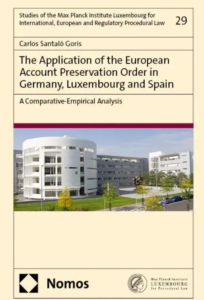Views
Children’s rights, private law and criminal law perspectives of parental child abduction
Written by Fanni Murányi, who will defend her PhD on Children’s rights, private law and criminological perspectives of parental child abduction at the Eötvös Loránd University (expected in 2024).
In this short summary of her research, Fanni highlights her conclusions on the role of the child’s views in abduction cases and the link between international child abduction and criminal law. She considered the legislative frameworks of the Hague Child Abduction Convention of 1980, the Brussels IIb Regulation (2019/1111) and the UN Convention on the Rights of the Child (UNCRC). She also investigated as well as the role of (domestic) criminal law. Read more
The Bahraini Supreme Court on Choice of Court Agreements, Bases of Jurisdiction and… Forum non Conveniens!
I. Introduction:
In a previous post on this blog, I reported a decision rendered by the Bahrain High Court in which the court refused to enforce a choice of court agreement in favour of English courts. The refusal was based on the grounds that the case was brought against a Bahraini defendant and that rules of international jurisdiction are mandatory. The Bahraini Supreme Court’s decision reported here is a subsequent development on the same case. The ruling is significant for many reasons. In a methodical manner, the Supreme Court identified the foundational justifications for the jurisdictional rules applied in Bahrain. Moreover, it clarified the role and effect of choice of court agreements, particularly their derogative effect. Finally, and somehow surprisingly, the Court supported its position by invoking to “the doctrine of forum non conveniens”, explicitly mentioned in its decision. Read more
“Other Appropriate Connections”: China’s Newly Adopted Jurisdiction Ground
Written by Jidong Lin, Wuhan University Institute of International Law
- Background
China’s newly amended Civil Procedure Law (“CPL 2024”), which came into effect on 1 January 2024, introduces several distinct and innovative changes. Among the most notable is the incorporation of “other appropriate connections” as a jurisdiction ground. Article 276 of the CPL 2024 addresses the jurisdiction of Chinese courts over foreign-related disputes where the defendant lacks domicile in China. Paragraph 1 of Article 276 lists six jurisdiction grounds, including the place of contract formation, place of contract performance, place of the subject matter, place of distrainable property, place of tort, and place of representative offices. As a supplement, Paragraph 2 provides that “notwithstanding the preceding paragraph, foreign-related civil disputes that have other appropriate connections with the People’s Republic of China may fall under the jurisdiction of the People’s Courts.” The term “other appropriate connections” represents a legal innovation not only within Chinese legislation but also on a global scale. Currently, there is no official interpretation or guidance on its precise meaning, making it essential to analyze and evaluate this jurisdiction ground and its potential implications for jurisdictional practices. Read more
News
The Conflicts Vineyard: In the Footsteps of Symeonides

It is a real pleasure to share a new essay by Professor Symeon C. Symeonides, written on the occasion of his retirement after fifty remarkable years in the field of conflict of laws. The essay, eloquently titled Reflections from Fifty Years in the Conflicts Vineyard, was presented as part of a symposium held in his honor in May 2024 at Willamette University College of Law, and sponsored by the AALS Section on Conflict of Laws. Read more
CoL.net Virtual Roundtable on the Commission’s Brussels Ia Report
In light of the Commission’s report on the Brussels Ia Regulation (first discussed here by Xandra Kramer), ConflictofLaws.net will be hosting an ad-hoc virtual roundtable
on Tuesday, 8 July 2025, 12pm–1.30pm (CEST).
The conversation will focus on the report published by the Commission on 2 June and its implications for a possible future reform of the Regulation.
The event will feature the following panellists:
Andrew Dickinson
University of Oxford
Stefano Dominelli
University of Genoa
Pietro Franzina
Catholic University of the Sacred Heart, Milan
Thalia Kruger
University of Antwerp
Tobias Lutzi
University of Augsburg
Everyone interested is warmly invited to join via this Zoom link.
Bridging Legal Systems: A Comparative-Empirical Study on the European Account Preservation Order by Dr. Carlos Santaló Goris
 Warmest congratulations to Dr. Carlos Santaló Goris on the publication of his book, The Application of the European Account Preservation Order in Germany, Luxembourg and Spain. A Comparative-Empirical Analysis (Nomos, 2025).
Warmest congratulations to Dr. Carlos Santaló Goris on the publication of his book, The Application of the European Account Preservation Order in Germany, Luxembourg and Spain. A Comparative-Empirical Analysis (Nomos, 2025).
This scholarly work offers a timely and much-needed exploration of the European Account Preservation Order (EAPO), the first cross-border civil interim measure at EU level. Conceived to enable the provisional attachment of debtors’ bank accounts across Member States, the EAPO aspires to procedural uniformity. Yet, as this study so lucidly demonstrates, its application remains deeply embedded in national procedural systems, giving rise to significant divergences and legal complexity.
With admirable clarity, analytical depth, and empirical rigour, Dr. Santaló Goris leads the reader through this intricate legal terrain. By examining, in particular, the operation of the EAPO in three distinct jurisdictions – Germany, Luxembourg, and Spain – his manuscript illustrates the practical challenges posed by procedural fragmentation while offering valuable guidance for navigating the instrument across legal systems.
This manuscript stands out as a thoughtful and impactful contribution to the field of European civil procedure. What distinguishes it most is its remarkable ability to bridge legal theory and judicial practice. Through a combination of comparative analysis, stakeholder perspectives, and data-driven insights, it offers a comprehensive and balanced account of how the European Account Preservation Order operates in practice, making it an indispensable resource for scholars, practitioners, and policymakers alike.
Congratulations, Carlos, on this well-deserved accomplishment!
More information on this book is available here.



